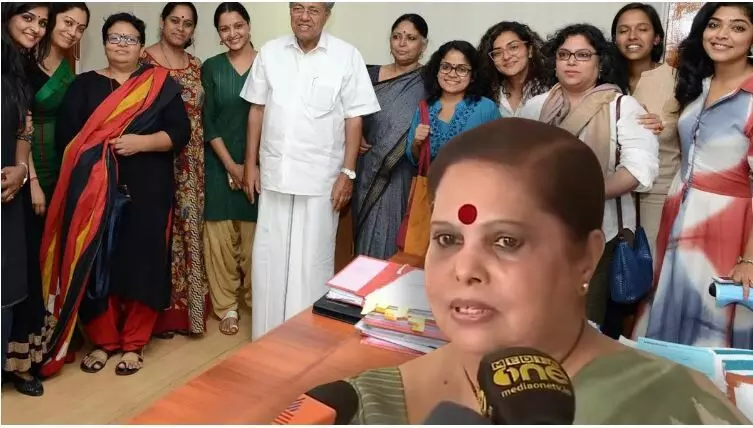
Hema Committee Report empowers women to challenge male power
text_fieldsWCC members with CM Pinarayi Vijayan and Justice Hema
The release of the Justice K Hema Committee report on August 19 has given many women actors in the Malayalam film industry the strength to come forward against the male-dominated, often predatory in nature, group, which has forced many bigwigs, including Director Ranjith and actor Siddique, to step down from their respective posts in the film industry.
The report points out a certain group, which is referred to as an all-male power group consisting of 10-15 individuals, highlighting it as a cause of gender imbalances in the industry. This group exerted its power to call for a ban on actors and influence the subjugation of those who sought other ways to resolve issues, particularly women actors, who seek action for their sexual harassment encounters.
The report, commissioned to investigate gender issues within the Malayalam cinema, underscores how women and even some men face the wrath of this powerful lobby that essentially governs the industry. Despite its detailed findings, the released version of the report is redacted, with the High Court allowing only a version without names to be made public. This has left the identities of the powerful individuals mentioned in the report undisclosed.
The committee frequently references the concept of "power" and the existence of a "power group," describing it as a mafia-like entity that expects everyone to comply with its demands. Those who refuse to obey are subjected to bans or are permanently ousted from the industry. These bans are often enforced without any formal notice or public acknowledgment, leaving the affected individuals ostracized within the industry without clear evidence of the reason behind their exclusion.
In cases involving women, a common tactic used to justify these bans is to label them as "MeToo" persons, referencing the global movement against sexual harassment. The report explains how the power group collaborates to ensure that women who speak out are silenced, with producers often pressured into not casting these 'banned' actors.
The Film Chamber of Commerce plays a role in this process by withholding necessary certificates, effectively preventing films from being released if they include a banned actor.
The report also highlights the ineffectiveness of Internal Complaints Committees (ICC) within the industry, mandated under The Sexual Harassment of Women at Workplace [Prevention, Prohibition, and Redressal] Act.
The committee argues that any ICC formed within the current power structure of the industry would be unable to protect women from harassment. Instead, it recommends the establishment of an independent tribunal to handle cases of sexual assault and abuse within the industry.
Despite the gravity of these findings, key industry figures have denied the existence of such a power group. The former general secretary of the Association of Malayalam Movie Artists (AMMA), who stepped down following an allegation of rape, stated before his resignation that he was unaware of any such group or mafia within the industry.
However, members of the Women in Cinema Collective (WCC) have emphasized the persistence of power structures that marginalize women and those with less influence. They point out that while similar issues exist in other film industries, including Hollywood, Kerala's more vocal and progressive community has been instrumental in bringing these issues to light.
The report's delayed release - nearly five years after it was submitted - has been criticized as further evidence of the power that this lobby holds over the industry and the government. Many believe the government only released the report when it was no longer possible to keep it hidden.
The Justice K Hema Committee report sheds light on the deep-rooted issues of power, gender discrimination, and harassment within the Malayalam film industry. It calls for significant structural changes, including the creation of an independent body to address sexual harassment, in order to dismantle the regressive power structures that continue to dominate the industry.






















